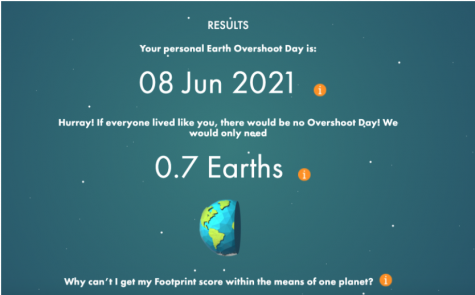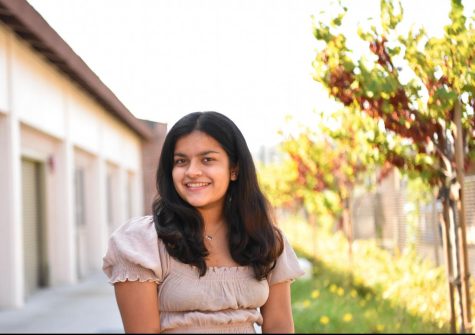Recycle, reduce, reuse BournVita jars
How I dealt with a bout of eco-grief
December 16, 2020
When I took my first sustainability course at De Anza College over the summer, greed was a defining theme of all our assignments. Whether it was humankind’s unashamed consumption of natural resources or American greed for Native land, this idea of wanting anything and everything not only destroyed our environment but also our well being.
The class started off with the basics: we’re consuming too much, and with the trajectory we’re on, the Earth is in serious danger. On a more individual scale, our class took the human footprint test, which indicates the extent to which our lifestyle is harming the environment. Compared to the rest of my class’ results, my environmental footprint wasn’t too shabby.
If everyone lived like me, we wouldn’t have an Earth Overshoot day, which is the day that our consumption surpasses the amount of resources we have in a year and occurred on August 22 in 2020. While this was really the bare minimum, I proudly posted my results on Canvas, feeling superior to the carnivores and frequent online shoppers in my class.

My gloating didn’t just stop there — I walked over to my parents and confidently told them the news. I was Mother Earth’s best friend. I was this close to putting an Earth emoji in my Instagram bio. But before I could do that, I unfortunately came to terms with the fact that I wasn’t the reason I had single handedly become the next Jane Goodall.
My parents, especially my mom, have always instilled this idea of conserving, saving and fixing, avoiding consuming and then consuming some more. Moving to a one bedroom apartment from India to America wasn’t all that glamorous, and my parents lived only with what they needed. And they were happy with it.
My mom didn’t find the need to go out and buy expensive clothing — it wasn’t really a priority for her in this huge, new country. Instead, she was happy what she had and made do with it. This value of conserving carried on throughout my childhood, and it’s always been a subtle yet constant aspect of my life. My mom loves to cook, and her influence can be seen in the kitchen.
You’ll see old BournVita (a chocolate powder mix to stir into your milk that was a staple of my childhood) jars being reused for various spices and flours. Paper towels aren’t used like they grow on trees — we always opt for dish towels that can be washed and reused. We save all of our plastic bags in a container for whenever they’re needed in the future. We don’t eat meat and poultry in our household, and we’ve always been encouraged to clear our plate when eating to reduce waste. If there is any waste, we typically put it into our compost bin in our backyard, which is filled with plants that my mom loves to garden in her free time.
And it’s not just physical changes to our home. Rather, it’s a sense of avoiding unnecessary consumption. Over quarantine, my sister, a former avid online shopper, opted to sell her clothes on various websites to declutter her closet and not be so focused on consumerism. I also contribute to saving the planet by stealing clothes from her closet instead of resorting to buying the same item.
Despite my family’s lifestyle that’s cleaner than most, I knew that there still was more to be done. While my family was progressing towards our eco-friendly ideal, I knew that America, as a whole, was regressing; taking care of the environment seems to be becoming less of a priority even as climate change only speeds up. At the end of the course, we discussed eco-grief, a common feeling of hopelessness about our environment.
But we also thought about ways to combat it, and one of the main ways to do so was to get off the news and the internet and to look around. Most of the time, when it comes to climate change, the breaking headlines are negative. It can be draining to look at all these rapidly progressing changes and not know what to do as one individual in this massive world.
The positives aren’t too difficult to find in our daily lives — they aren’t groundbreaking discoveries made by scientists. It’s the day-to-day life that our families and neighbors have implemented to help our community.
The positives aren’t too difficult to find in our daily lives — they aren’t groundbreaking discoveries made by scientists. It’s the day-to-day life that our families and neighbors have implemented to help our community. Cupertino is home to a large population of immigrants, many of whom were in similar situations as my family when they first came here. Immigrants still have that mentality of thinking before they spend as well as conserving what they already have, and it’s resulted in a generation of kids who are more cautious of their surroundings. I would rather go all the way home to get a reusable bag or juggle all my items in my hands than pay extra for a plastic bag, because not only have I been raised with that mentality, but I also now understand the damaging consequences of it. That combination is groundbreaking when it comes to the change we can make in conservation.
And while this might come across as ‘cheap,’ I see it as a step away from the norm of constantly buying and then buying some more. Because of this, conservation’s obviously going to be viewed as out of the ordinary from our usual emphasis on consumerism and greed.
So once in a while, look up from the headlines and observe what your community is doing. Prizing Tupperware containers, using the Danish butter cookie tin to store sewing supplies, reusing plastic bags religiously — our immigrant community and Cupertino as a whole is filled with families like mine that follow these mantras.
Especially since we’re in a pandemic, it’s the perfect opportunity to become aware of you and your family’s actions to combat the climate anxiety we all may feel at some point. Maybe you’ll also find a jar or two of BournVita that’s being reused in your kitchen, or perhaps you’ll find one about to be thrown out that you can use as your next cornstarch container. Whatever it may be, while an appropriate amount of eco-grief can be motivating, it’s really the change that occurs afterwards that matters.
















